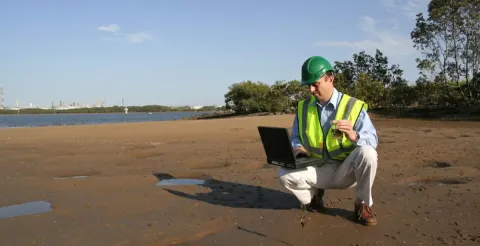The career opportunities for data scientists are constantly expanding. Advances in technology (e.g., 5G and IoT), along with the rapid growth of the profession itself, have encouraged data scientists to find new opportunities to flex their skills—and new ways to make a difference through their profession.
Recent statistics clearly show the growth of data science as a profession. Just a few years ago (in 2016 and 2017), 301,000 data science professionals were working in Australia. Now, there are more than 339,000. What’s more, the annual expected growth rate of professions in this industry continues to expand. For perspective, the average growth rate of all professions in the Australian workforce was 1.5 per cent between 2016-17 and 2021-22, while the growth rate of the data science profession was 2.4 per cent.
Data scientists now work in a wide variety of industries, many of which serve the public good, such as journalism, urban development and non-governmental organisation (NGO) work. Leveraging data scientist skills allows organisations in these industries to become more efficient and to find new ways to achieve their goals. There are many potentially lucrative data science careers to choose from that can make a positive impact.
1. Environmental Science and Conservation
Data science has come to occupy an important role in the environmental sciences. By integrating massive amounts of environmental data into unified datasets, environmental scientists can discover or confirm ecological patterns that would otherwise be too subtle to detect, or too small to draw statistically significant conclusions about.
How is data science making a difference in environmental science and conservation?
Satellite images that track environmental changes such as deforestation patterns are often studied using data science techniques. For example, data scientists can analyse geographic information as quantitative data by using formal spatial analytics frameworks to describe location data in terms of variables including longitude, latitude, elevation and time.
Such essential data can inform environmental management and also provide insights into issues such as climate change over time. For example, data has been informing scientists’ attempts to save the Amazon rainforest as longitudinal studies revealed that it’s now on the brink of becoming a savanna.
Those with an interest in environmental data science have access to plenty of free data to play with. Examples of such data are:
- Department of Agriculture, Water and the Environment (DAWE) open data
- State of the Environment (SoE) report
These websites offer access to high-quality datasets relevant to climate change, biodiversity and other important topics.
2. Structural Analysis & Building Design
Data science is becoming an important part of how engineering services analyse structures to ensure their safety. Structural health monitoring (SHM) traditionally relies on visual inspection; however, the advent of internet-connected sensors in building material has made it possible for engineering firms to take an analytics-driven approach to SHM.
How is data science making a difference in structural analysis and building design?
The integration of sensors into buildings allows their structural health to be monitored continuously, in-real time. By utilising machine learning and data engineering techniques, data scientists can design sensor-driven SHM systems that will automatically issue alerts to engineers of potential problems.
Computer vision techniques offer another important tool for structure assessment. Through the use of deep learning techniques, data scientists are able to train algorithms to identify visual features (such as cracks) that may indicate a significant structural problem. This process takes a fraction of the time that a manual inspection would.
The integration of data science into structural engineering is a still-emerging field with plenty of room for further innovation. One company that is innovating new uses for data science in the field is the Melbourne-based startup Snobal, which develops extended reality services that use machine learning to simulate potential building designs.
Services such as the immersive virtual working experience delivered by Snobal have proven particularly useful during the pandemic when the majority of the workforce was forced to work from home due to lockdowns.
3. Data Journalist & E-Discovery Investigator
Data journalism is, as the name suggests, the practice of using data analytics for journalism. While its origins actually pre-date data science, the emergence of data journalism as a recognised profession has occurred in parallel to the growth of data science itself, and reflects the growing availability of publicly accessible data and easy-to-use data visualisation tools.
How is data science making a difference in data journalism?
The most common form of data journalism is data storytelling—using data visualisations to illustrate complex ideas. For example, Gapminder—a global poverty-focused NGO—uses data journalism to illustrate global development issues. Its high-quality datasets have become popular among data scientists. Data journalism stands apart from traditional journalism in that it relies on data which can typically be freely accessed and inspected by other journalists.
Data science is also a potent tool for investigative journalism. When Edward Snowden leaked a large amount of classified NSA files, The Guardian used exploratory analytics and visualisation techniques to turn thousands of pages of raw data into an easy-to-understand interactive analysis of the content. Organisations such as the International Consortium of Investigative Journalists also use data science to facilitate their work.
E-discovery investigators perform work similar to investigative data journalism, but for legal industry clients instead of the media. As such, their chief responsibility is to find and analyse data that provides evidence of illicit activities, including fraud. According to Robert Half, e-investigation is an important emerging tech job.
4. Sustainable and International Development
A growing number of IGOs and NGOs have turned to data science to inform their development work. By using data analytics to power knowledge management and decision support systems, these organisations are able to make more informed decisions about how best to achieve their goals.
How is data science making a difference in sustainable and international development?
Decision support systems use data science methods to understand the impact that a decision may have on a project. In development contexts, this gives NGOs the ability to anticipate, recognise and mitigate potential errors in their programs, and to ensure resources are allocated in a manner that maximises their impact.
Knowledge management methods require data scientists to collect, integrate, collate, structure, and summarise an organisation’s data to improve its usability. This process, which includes using text analytics to capture unstructured data such as text documents, enables NGOs to take full advantage of the lessons their workers have learned over the years.
The United Nations now recognises analytics-driven decision making as an important part of sustainable development programs. In a space where “sustainability” requires efficiency, giving practitioners access to more information and providing tools to measure a project’s resource use and impact can be vital to its success.
Data has – and continues to have – many real-world applications in sustainable and international development. Projects that have been aided by data analytics include the following
- Tracking disease
- Improving food security
- Satellite monitoring of people’s welfare on remote islands
Data science is integral to continue the innovative work in international development into the future.
5. Smart City (Infrastructure) Developer
The Internet of Things (IoT) has provided data scientists with the ability to use their skills to directly impact the physical world. For urban planners, the relationship between IoT and data science is fostering the rise of “smart cities”—cities that can analyse and respond to changes in the urban environment to better serve the population.
The integration of internet-connected sensors into public spaces allows urban services to be made more efficient and responsive to public needs. As municipal budgets are often relatively limited relative to the needs of the constituents that the budget is supposed to serve, the Australian Government is looking to smart city technology as a way to produce more efficient investments and innovation in public services, such as transit.
How is data science making a difference in smart city (infrastructure) development?
Even more ambitious plans for data-driven cities are being developed abroad—Sidewalk Labs (i.e., Google) is planning to completely redevelop an entire Toronto neighbourhood. The project’s leaders hope to demonstrate that the efficiencies created by smart city development can be used to subsidise affordable housing initiatives.
Data science jobs in the smart city sector operate at the interface of the public and private sectors—approximately 45 per cent of the attendees at Australia’s annual Smart Cities Week conference are public employees. Telstra and Launceston are currently working on a smart city plan to improve waste management and traffic flow, and other telcos including Nokia and Cisco have also expressed interest in developing Australia’s smart city infrastructure.
Data science jobs can make a difference
Data science offers a variety of opportunities for anyone looking to make a positive impact. Whether it be a corporation, government or NGO—data science can empower organisations of every shape and size, making it a promising career for anyone that wants to contribute to a specific industry.
If you want a profession that empowers you to advance your passion, UNSW’s Master of Data Science offers a way to achieve that ambition. For more information, contact us on 1300 974 990.






